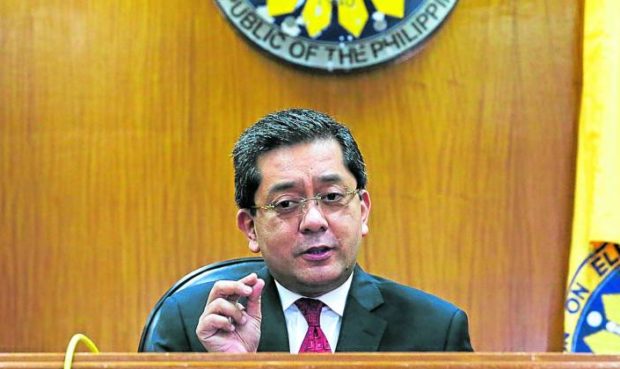Vote-buying reports reach Comelec; more VCMs rejected

Commissioner George Garcia in a media briefing on the first day of Local Absentee Voting held at the Comelec Session Hall, 8th floor, Palacio del Gobernador, Intramuros. (INQUIRER PHOTO/LYN RILLON.
MANILA, Philippines — As the campaign period officially ended on Saturday, two days before the May 9 polls, the Commission on Elections (Comelec) said it had already received “numerous” reports of vote-buying but was investigating only 10 cases so far.
And only one of the 10 cases under investigation has been considered a “possible case for vote-buying” as it is relayed to the poll body through a formal complaint with corresponding evidence, according to the Comelec-led interagency task force against vote-buying.
“As of today (May 7), we have 10 active cases and counting as we are continually receiving numerous reports and complaints of vote-buying in our official email address and Facebook page,” Task Force Kontra Bigay said in a statement.
“We have one possible case for vote-buying as the complainant has already executed an affidavit and submitted pieces of evidence,” the task force added, as it also thanked the Integrated Bar of the Philippines and the watchdog Legal Network for Truthful Elections (Lente) for their assistance.On Friday, the task force opened a Facebook account (facebook.com/kontrabigay2022) and an email address (kontrabigay@gmail.com) to receive complaints of vote-buying.
When the task force was constituted under the office of Comelec Commissioner Aimee Ferolino last month, it vowed to initiate an investigation and file cases on its own or even without a formal citizen complaint.
“The task force is urging the general public not only to report incidents of vote-buying or vote-selling but [also] to come out and actively participate in the investigation through the execution of an affidavit and submission of evidence,” the task force added in Saturday’s statement.It warned that a candidate found guilty in a final court decision “or found by the Comelec of having given money or other material consideration to influence, induce or corrupt the voters or public officials performing electoral functions shall be disqualified from continuing as a candidate, or if he has been elected, from holding office.”
The task force is composed of the Philippine National Police, Armed Forces of the Philippines, Department of Justice-National Prosecution Service, Department of the Interior and Local Government, Bangko Sentral ng Pilipinas, Anti-Money Laundering Council, National Bureau of Investigation, Philippine Information Agency and the Presidential Anti-Corruption Commission.Also on Saturday, the last day of “final testing and sealing” of the vote-counting machines (VCMs) to be used on May 9, the number of VCMs that malfunctioned climbed to 790 (from 355 on Thursday) out of more than 86,479 machines tested as of noon of May 7.
The number of secure digital (SD) cards that contain instructions to the VCM on the counting of ballots increased to 143 (from 44).
The Comelec still had to test close to 20,000 VCMs and their counterpart SD cards before the end of the day, to confirm that all 106,174 for deployment in the elections are in good condition and have no prerecorded data of votes.
The poll body reported that as of Saturday noon, 233 of the 790 defective VCMs had been replaced. Same with 107 of the 143 defective SD cards.
Comelec Commissioner Marlon Casquejo, chair of the election steering committee, said finding a number of malfunctioning VCMs was “normal since the machines are about 9 years old. They’ve been used three times although we repaired them, refurbished them.”
The Comelec has set aside 1,100 machines for contingency, in case any VCM fails to work on Election Day and could not be repaired by assigned technicians.
It has refurbished the more than 97,000 VCMs used in the 2019 elections and leased 10,000 more from Smartmatic, the country’s automated elections supplier since 2010.
Defective ballots
The Comelec also assured the public on Saturday that ballots unused on May 9 would not be used for cheating.
“All unused ballots will be torn in half by all electoral boards [of inspectors] as part of the proceedings after voting. These are stated in the general instructions for electoral boards. Both halves will be placed in separate envelopes,” said Comelec acting spokesperson Rex John Laudiangco.
In the presence of the media, political party representatives and other observers, the Comelec destroyed 586,988 defectively printed ballots, along with 346,323 other ballots and forms used for demonstration purposes.
The defective ballots were cut into three by a machine at the National Printing Office.
The Comelec prepared a total 67,442,616 ballots for Monday’s elections, including those for 1.6 million overseas voters.
RELATED STORIES
1Sambayan to Comelec: Probe vote buying, faulty VCMs
Report vote buying incidents to cops near poll precincts — Comelec